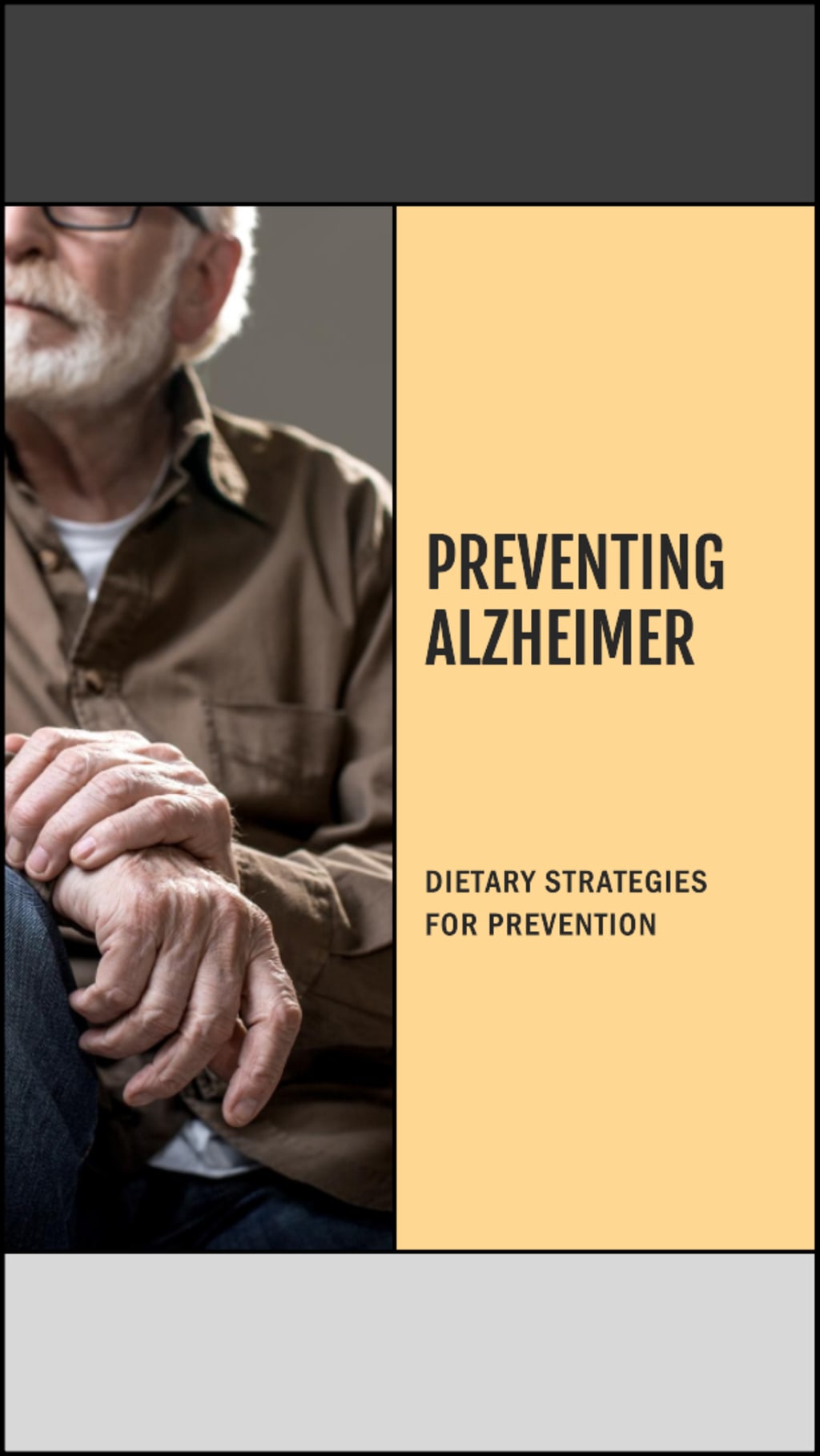Dietary Strategies for Alzheimer’s Prevention
Understanding the Role of Nutrition in Combating Cognitive Decline

we delve into a topic of growing interest – good food for preventing Alzheimer’s. In the quest to battle this cognitive illness, it has become crucial to understand the link between dietary choices and brain health. Our discussion will revolve around three foods that help memory loss, we will explore the vegetables that prevent Alzheimer’s, and present three ways to prevent Alzheimer’s as guided by research. And to tie it all together, we’ll also uncover the number 1 way to prevent Alzheimer’s. Buckle up as we take this culinary journey towards better cognitive health.
Alzheimer’s disease, a form of dementia, is a significant public health concern that affects millions of people worldwide. It’s no wonder that scientists have been tirelessly looking into preventative measures and treatments, with a strong focus on the role of nutrition. Let’s dive deeper into an examination of the three foods that can help mitigate memory loss, a common symptom of Alzheimer’s disease.
1. Berries: These vibrant fruits, with their rich hues and sweet tang, are not just delightful to the palate, but are also powerhouses of nutrition, specifically for brain health. Berries such as blueberries, strawberries, and blackberries are loaded with antioxidants like flavonoids, anthocyanins, and tannins, which play a vital role in combating oxidative stress and inflammation, two major contributors to cognitive decline. Regular consumption of berries can potentially decrease the risk of Alzheimer’s disease and improve overall memory function.
2. Fatty Fish: For those looking for brain-boosting proteins, fatty fish, such as salmon, trout, and sardines, are your go-to foods. They are replete with Omega-3 fatty acids, which are essential nutrients that aid in brain function. These fats are a major building block of the brain and are known to slow down brain aging, reduce inflammation, and lower the risk of Alzheimer’s. Regular consumption of fatty fish can promote brain health and maintain cognitive functions.
3. Turmeric: A cornerstone of many Asian cuisines, this potent spice has several health benefits, including neuroprotective properties. It contains curcumin, a bioactive compound that can cross the blood-brain barrier. It has both anti-inflammatory and antioxidant benefits, and can help clear out amyloid plaques, which are a hallmark of Alzheimer’s disease. Including turmeric in your diet can boost memory and cognitive functions.
The preventative measures against Alzheimer’s are not only restricted to certain types of foods but can also be found in everyday vegetables. By incorporating certain veggies regularly into your meals, you can drastically reduce the risk of developing Alzheimer’s.
Broccoli: This green vegetable, a staple in many diets, is packed with antioxidants and vitamin K. These substances support brain health and are believed to be involved in brain healing and cell regeneration. Including broccoli in your diet can potentially lower your risk of cognitive decline and enhance your brain health.
Pumpkins: This versatile vegetable, popular in both sweet and savory dishes, is high in antioxidants and a rich source of vitamin A, both of which are essential for brain health. Pumpkins can protect the brain against free radical damage and reduce the risk of neurological diseases like Alzheimer’s. Consuming pumpkins in various forms can offer you these brain-boosting benefits.
Spinach: Another green leafy vegetable that is high in nutrients and antioxidants is spinach. It is great for brain health and may decrease the risk of Alzheimer’s disease. Spinach is rich in folate and vitamin E, both of which are beneficial for cognitive health. Including spinach in your diet can ensure you receive these benefits regularly.
“Alzheimer’s disease might seem insurmountable, but every step we take towards a healthier lifestyle – be it through physical exercise, mental stimulation, or social engagement – is a step closer to building our brain’s resilience against this condition.” – Anonymous
Let’s continue our exploration with the three ways to prevent Alzheimer’s that go beyond just nutrition. While food is an essential building block of brain health, there are other key aspects of our lifestyle that can significantly influence our risk of developing Alzheimer’s disease.
Physical Exercise: Physical fitness isn’t just for body builders or athletes, it’s for everyone who desires good health – brain health included. Regular physical activity increases blood flow to the brain, enhancing the health of brain cells, and may even help the brain create new ones. It also boosts the size of the hippocampus, the brain area involved in memory and learning, thereby enhancing cognitive function. Walking, cycling, swimming, or participating in group exercise activities could go a long way in ensuring that your brain stays healthy. Research has linked physical activity to delayed brain aging and improved cognitive function, thereby reducing the risk of Alzheimer’s.
Mental Stimulation: We’ve often heard of the phrase “use it or lose it”, and it applies aptly to our cognitive abilities as well. Engaging in activities that challenge and stimulate the brain, like reading, writing, playing strategic games, or even learning a new language or musical instrument, can help build up cognitive reserves. This mental exercise can stimulate connections between nerve cells and even help the brain generate new ones, thereby enhancing cognitive reserve and brain plasticity, potentially delaying the onset of Alzheimer’s symptoms.
Social Engagement: Humans are inherently social creatures, and our brains are wired for social interaction. Regular engagement in social activities or maintaining a strong social network can delay the onset of Alzheimer’s disease and slow its progression. Activities could be as simple as having a conversation with a friend, participating in a club or community activities, volunteering, or even taking a class. The key is to stay connected and engaged, which fosters a sense of purpose and mental well-being.
Finally, let’s touch on the number 1 way to prevent Alzheimer’s. It’s important to understand that Alzheimer’s is a multifaceted condition, influenced by a myriad of factors, including genetics, age, and lifestyle. Thus, the most effective prevention strategy combines a balanced diet with regular physical and mental exercise, and robust social engagement.
In essence, it is a lifestyle approach: maintaining a balanced diet high in brain-supportive foods and vegetables, staying physically active, keeping the mind challenged and engaged, and fostering strong social connections are all pivotal components in this battle against Alzheimer’s. All these elements together form the backbone of the number 1 way to prevent Alzheimer’s.
In conclusion, the battle against Alzheimer’s is a comprehensive one, involving a dynamic combination of a balanced diet rich in specific foods and vegetables, physical activity, mental stimulation, and social interaction. By consciously incorporating these elements into our daily lives, we can potentially reduce the risk of Alzheimer’s and boost overall brain health. So let’s embrace these methods not only as preventative measures against Alzheimer’s but also as a pathway to improved well-being. Remember, our health is an investment, not an expense. Invest wisely in your choices today for a healthier and more fulfilling tomorrow.
FAQ
1. What is Alzheimer’s disease?
Alzheimer’s is a progressive brain disorder causing memory loss, thinking issues, and behavioral changes.
2. What causes Alzheimer’s disease?
The exact cause is unknown, but it’s likely due to a mix of genetic, environmental, and lifestyle factors. It’s associated with abnormal protein deposits in the brain.
3. What are the symptoms of Alzheimer’s disease?
Symptoms include mild to severe memory loss, confusion, mood changes, suspicion, and difficulty speaking, swallowing, and walking.
4. How is Alzheimer’s disease diagnosed?
It involves a thorough medical evaluation, including physical and neurological exams, medical history, mental status testing, and sometimes brain imaging and blood tests.
5. Is there a cure for Alzheimer’s disease?
As of September 2021, there is no cure. Treatments available can help manage symptoms, and ongoing research is focused on finding more effective treatments and a cure.
About the Creator
DAVID WILLIAMS
Your trusted guide in the world of product choices. Through expert analysis and thorough comparisons, I help you confidently navigate the product landscape. Join me to discover, compare, and review the latest in the market.






Comments
There are no comments for this story
Be the first to respond and start the conversation.